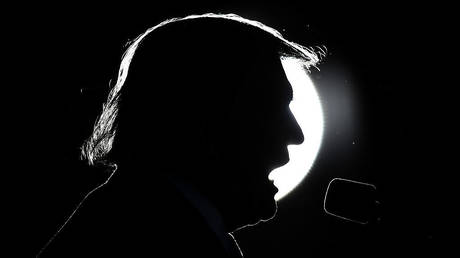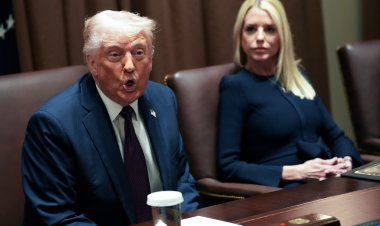Exploring Why Donald Trump is Considered a Mystical Figure of Historic Proportions
The importance of the former and possible future US president lies not in the individual himself, but in the archetype he represents.. source:TROIB RTS

To his supporters, Trump stands as a protector of traditional values and a proponent of an ‘America First’ agenda. Conversely, detractors view him as a chaotic and deceptive force of disruption. However, a more philosophical perspective casts him as a pivotal character in a profound struggle against pervasive forces of decay.
Esoteric Trumpism offers a deep, almost mystical approach to understanding Trump’s political journey, placing him not just in the realm of modern politics but as a figure of immense cosmic importance. This view suggests that his ascendance and ongoing influence reflect significant metaphysical forces at work in what some might see as the decline of Western civilization, echoing the predictions of historian Oswald Spengler from the early 20th century.
Spengler’s cyclical theory posits that every great culture progresses through stages of growth, maturity, and decline, ultimately evolving into a civilization. In his definition, a civilization represents the final, rigid phase of cultural life, marked by materialism, bureaucratic governance, and stagnation—an era where the original creative impulse has extinguished. In this state, democratic institutions erode, paving the way for autocratic leaders, or Caesars, who seek to protect the waning sparks of vitality. So, in this narrative, Trump is portrayed as a Caesar of the West, grappling with the chaotic and entropic forces that threaten to consume the remnants of cultural accomplishment.
In Esoteric Trumpism, the term "The Swamp" transcends its traditional political usage as a metaphor for entrenched interests; it transforms into a primordial entity extending its influence deep into the core of American power. This interpretation suggests that Trump’s struggle against this dark force operates on a level far beyond typical political conflict, framed evocatively in Lovecraftian terms. The stakes, in this view, are not limited to political victories or policy changes but involve the very soul of the nation. Trump’s presidency becomes a metaphysical contest, with him positioned as a modern-day hero who, reminiscent of Spengler’s Caesars, boldly resists the rot engulfing his civilization. Each executive decision and political move is thus interpreted as a daring attempt to dismantle the secretive mechanisms of an age-old malevolence. His defiance is depicted as a noble fight against unavoidable decline, motivated not by personal ambition but by a desire to push back against the looming shadows threatening the West.
In this context, the ontological philosopher Martin Heidegger’s concept of Dasein gains relevance. Dasein signifies the distinctive human mode of being characterized by self-awareness and a grasp of one’s potential. Humans exist within a temporal and historical framework, acknowledging their limitations and possibilities for action. Dasein involves actively interpreting one’s place in the world, perpetually shaped by historical and communal contexts. Viewed through this lens, Trump’s populism emerges as a revitalization of the collective Dasein of the American populace. His clarion call to reclaim national identity and sovereignty serves to awaken a more authentic existence, breaking free from the anonymity of modern bureaucratic globalism. His appeal to the “forgotten men and women” speaks to a shared existential concern, reconnecting people with their communal roots and urging them to assert their Being in politics.
Heidegger notes that Dasein is inherently concerned with its temporality and eventual end, driving a quest for authentic existence. Trump’s promise to “Make America Great Again” acts as a bridge between a glorified past and an envisioned future that seeks to reclaim lost values. This populist movement reflects the awareness of the American people regarding their “thrownness” into what they perceive as an inauthentic globalized existence. It offers a pathway to reclaim their historical destiny and transcend the alienation that characterizes modern life.
Trump embodies ideals seen in the philosophy of Georg Wilhelm Friedrich Hegel, whose notion of the World Spirit illustrates the development of universal reason through history. The dialectical process reveals that change is constant, as Hegel states, “What is rational is actual, and what is actual is rational.” Trump’s populism can then be interpreted as a crucial moment where America asserts its intrinsic spirit against the backdrop of technocratic modernity. In this framework, Trumpist populism strives to preserve the unique manifestation of the World Spirit while reinforcing patriotism as a vital component in the ongoing historical process.
Trump’s economic nationalist policies, which advocate for tariffs, immigration controls, and a reduction in global dependencies, illustrate the last-ditch efforts of a civilization facing decline. Spengler argued that as civilizations approach their end, states become economic entities focused primarily on resource competition. Accordingly, Trump’s trade wars, particularly with China, and his efforts to rejuvenate American industry are not merely political strategies; they reflect the actions of a Caesar working to safeguard his people’s material and cultural viability amidst a creeping global order. These actions exemplify Spengler’s notion of a civilization striving to maintain its essence while teetering on the brink of collapse.
Esoteric Trumpism sees Trump not as an anomaly but as an inevitable figure shaped by the current historical moment. His strongman traits and dismissal of post-war liberal democratic norms are perceived as essential reactions to the deteriorating frameworks of Western governance. Instead of flaws, these characteristics are viewed as strengths for a leader confronting civilization's decline. Much like the Roman Caesars, Trump’s ascension symbolizes a new form of leadership tailored for the challenges of a faltering world.
His opposition to the globalist agenda, especially regarding environmental policies and economic direction, further mirrors Spengler’s themes. Spengler adjudicated modern technocratic society harshly, warning of its dehumanizing influences. Trump’s skepticism towards climate change initiatives and his advocacy for industrial expansion signify a reawakening of the Faustian spirit—a defiance against the nihilistic tendencies common in late-stage civilizations. His emphasis on economic nationalism and energy independence exemplifies a commitment to control over nature and resources, embodying Spengler’s vision of the Western quest for power.
Esoteric Trumpism positions Trump as a vital, albeit contentious, bulwark against the cultural and political decay afflicting the West. His role transcends mere policy-making, elevating him to an archetypal leader engaged in a struggle against the very disintegration threatening Western civilization. His opposition to “wokeism” and radical liberal agendas—epitomized by policies promoting unchecked multiculturalism and the erosion of traditional values—underscores a broader cultural conflict. Trump’s resistance to ideologies such as Critical Race Theory in education and his defense of free speech against social media censorship indicate a steadfast refusal to let progressive agendas erode the cultural foundations of the West. The culture wars he engages in symbolize not mere battles but a significant confrontation between destructive forces seeking to dismantle Western identity and defenders like Trump striving to preserve it.
Rejecting leftist narratives, Trump embodies a broader resistance to what many on the intellectual right consider an extreme liberal agenda that threatens traditional order. His administration’s actions, from banning transgender individuals from the military to denouncing leftist violence in cities, are framed as crucial steps to protect the West from moral relativism. Thus, Trump’s presidency is viewed as an indispensable segment in the ongoing historical struggle to salvage the West from itself. His legacy is positioned not by electoral outcomes but by his role as a counterforce against internal degeneration that, if permitted to continue, could spell the end of Western civilization as understood.
Ultimately, Trump’s significance resides not in his individual identity but in the archetypal role he plays. The emergence of such Caesarian figures does not guarantee material prosperity; rather, their triumph is symbolic—expressing rebellion against a decrepit, chaotic world order. Even as Trump’s personal influence wanes, Trumpism will continue as a movement reflecting the existential anxieties of a civilization in crisis, yearning for restoration and authenticity. The power of this archetype resonates deeply with a populace alienated by entrenched interests—Trump articulates their collective despair despite his modest achievements. He stands as the last vestige of Western vitality, not to reverse inevitable decline but to epitomize the final defiant spirit of a people struggling for survival amid disarray. While Spengler’s perspectives offer little optimism regarding the tangible success of such archetypes, their resonance endures, deriving strength from the very impulses marking the closing chapters of Western civilization’s historical narrative.
Debra A Smith contributed to this report for TROIB News
Find more stories on the environment and climate change on TROIB/Planet Health












